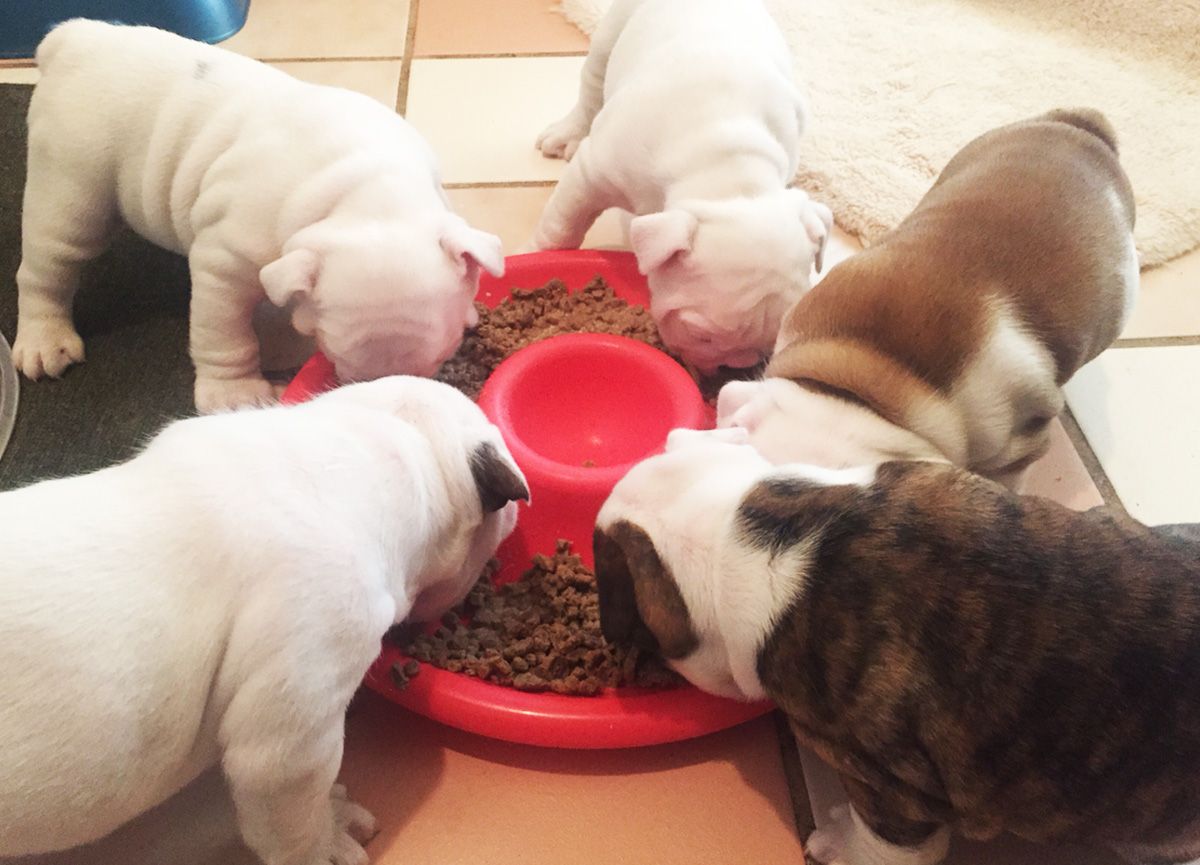English Bulldog Puppy Basics, Care, and What to Do
English Bulldogs are an irresistible and they make great companions for families and individuals alike, but before bringing an English Bulldog puppy home, it's important to understand their unique nutrition needs.

English Bulldogs are adorable, friendly, and loyal dogs. If you're thinking of bringing an English Bulldog puppy home, there are a few things you need to know to ensure your puppy stays healthy and happy.
Care:
When it comes to English Bulldog puppies, it's essential to provide them with proper nutrition, exercise, and socialization. Feeding your puppy a balanced diet of high-quality puppy food is crucial for their growth and development. You should also ensure your puppy gets plenty of exercise to keep them healthy and prevent obesity (We all know bulldogs tend to be chubby, but you don't want to make it so they get unhealthy).
English Bulldogs are prone to several health issues, including hip dysplasia, skin allergies, and respiratory problems. Regular vet check-ups and vaccinations can help prevent these issues. (Stay on top of your regular vet checks and keep your shots up to date). Check out our article on wrinkle and yeast infection care.
Socialization is also essential for English Bulldog puppies. Early socialization can help them develop positive behavior and prevent aggression towards other animals and people.
Bringing Your English Bulldog Puppy Home:
When you bring your English Bulldog puppy home, make sure you have everything they need. This includes a comfortable bed, puppy food, water bowl, collar, leash (We suggest a harness and never a leash with just a collar), and toys. It's also important to puppy-proof your home and ensure it's safe for your new furry friend.
English Bulldogs, like any other puppies, can be mischievous and strong-willed. They have a playful and curious nature and may test boundaries as they explore their environment.
English Bulldogs are also known for their stubbornness, which can make training challenging at times. However, with patience and persistence, you can teach your puppy to follow commands and respect boundaries. It's important to use positive reinforcement techniques such as treats, praise, and toys to motivate your bulldog puppy and make training a fun and rewarding experience. (Food-motivated training is best).
Start training your puppy early on basic commands like "sit," "stay," and "come." Positive reinforcement training works well with English Bulldogs. Praise and rewards can motivate them to learn and behave well.
Nutrition:
(Check out our article on overall nutrition as well)
Proper nutrition is crucial for the growth and development of an English Bulldog puppy. As a puppy, they require a diet that is specifically formulated for their nutritional needs. Here are some important things to keep in mind when it comes to feeding your English Bulldog puppy:
- Choose a high-quality puppy food: Look for a high-quality puppy food that is specifically formulated for large breed puppies. The food should contain balanced nutrition with essential vitamins, minerals, and amino acids. Avoid foods that contain fillers, artificial preservatives, and by-products.
- Feed your puppy 2-3 times a day: English Bulldog puppies should be fed 2-3 times a day, depending on their age and activity level. Consult with your veterinarian to determine the right feeding schedule and portion sizes for your puppy.
- Monitor your puppy's weight: English Bulldog puppies are prone to obesity, which can lead to health issues later in life. Monitor your puppy's weight and adjust their portion sizes accordingly.
- Avoid overfeeding: Overfeeding can lead to excessive weight gain and health problems. Stick to the recommended portion sizes and avoid feeding your puppy table scraps or human food.
- Provide fresh water: Make sure your English Bulldog puppy has access to fresh, clean water at all times. Clean their water bowl regularly to prevent bacteria growth.
**Pro-Tip!
Bringing some of the local water from where your bulldog puppy came from could potentially help avoid diarrhea caused by a sudden change in water sources. However, it's important to note that not all puppies will have a sensitive stomach and may be able to adapt to the new water source without any issues.
If you do decide to bring local water, it's important to gradually mix it with the water you have at home to help your puppy's digestive system adjust. Gradual changes are key to avoiding any upset stomachs. You may also want to consider gradually transitioning your bulldog puppy to a new brand of food if you plan on switching their diet.
Our first bully (Ghangis) came from a farm in northern Michigan. This was a great idea since the family we got him from had well water.
Starting out this is a great brand formulated for bully puppies. It's expensive but a good choice to start off with. Switching foods down the road is certainly fine, and our girls have tried all kinds of brands (see our basic nutrition article). RAW diet is an option as well, that will be discussed later in another article. Not everyone can jump on that wagon.
TRY THESE: (Very highly rated foods for pups, especially bullies)
Royal Canin Bulldog Puppy Dry Dog Food:


ORIJEN Dog Puppy Recipe:



